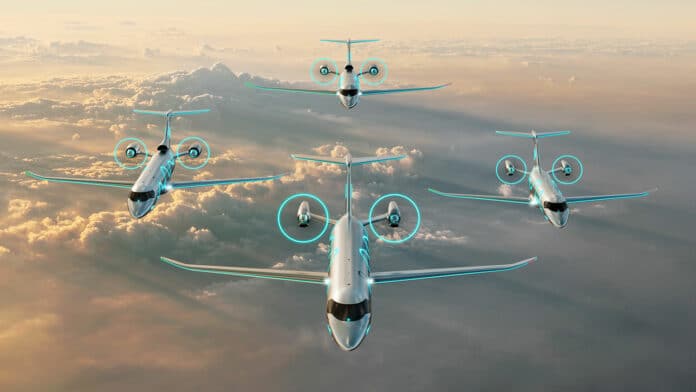A global aerospace company, Embraer, revealed new aircraft concepts as part of the company’s progress report on Energia – Embraer’s initiative to get the aviation industry to net zero by 2050.
A year after Embraer’s Sustainability in Action event, which detailed the study of four new aircraft concepts powered by new technologies and renewable energy, the company has been focusing on two 19-30 seater designs for hybrid electric and hydrogen-electric propulsion.
Initially, Energia comprised four concepts: two nine-passenger aircraft (one hybrid-electric, one all-electric), one 19-seater powered by hydrogen fuel cells, and one powered by hydrogen-burning turbine engines to carry 35-50 passengers.
Embraer says Energia will now focus on developing two hybrid-electric aircraft – Energia Hybrid (E19-HE and E30-HE) – and two aircraft powered by hydrogen fuel cells – Energia H2 Fuel Cell (E19-H2FC and E30-H2FC) – each with a 19 and 30 seat variant.
The Energia Hybrid will use hybrid-electric propulsion, sporting rear-mounted engines, and optimized architecture. The aircraft will have a range of about 500nm (926km). It will be compatible with 100% SAF, allowing drastic 90% carbon emission reductions. Even with conventional jet fuel, it will still cut emissions by 30%. The aircraft will also help reduce the noise level by 60%. The company could bring the new Energia Hybrid designs to service in the early 2030s.
The Energia H2 Fuel Cell will be equipped with high-specific power fuel cells and rear-mounted electric engines. It will feature zero carbon emissions, 70% lower external noise, and a range of at least 200 nm (370 km). It is expected to enter the services in 2035.
While still in the evaluation phase, the architectures and technologies are being assessed for technical and commercial viability. The Energia Advisory Group has also been launched to harness inputs and collaboration from partner airlines.
“As new propulsion technologies will be first applied on smaller aircraft, Embraer is in a unique position. The 19 and 30-seaters are sensible starting points for focused studies since they are likely to present earlier technical and economic readiness,” said Luis Carlos Affonso, Sr. VP of Engineering, Technology and Corporate Strategy, Embraer. “While the challenges of net-zero are significant, in less than 25 years, our commercial aircraft have already reduced fuel burn and CO2 emissions by almost 50% on a seat/mile basis, using only conventional fuels and propulsion – I’m convinced net-zero is a goal we can reach.”
